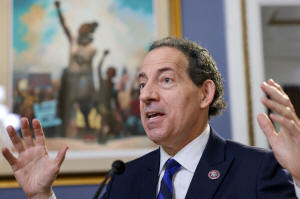Trump attempt at a coup to be a focus of U.S. House hearings, lawmaker
Raskin says
 Send a link to a friend
Send a link to a friend
 [April 18, 2022]
By Richard Cowan [April 18, 2022]
By Richard Cowan
WASHINGTON (Reuters) - Then-President
Donald Trump attempted a coup on Jan. 6, 2021, and that will be a
centerpiece of committee hearings in Congress next month, said Democrat
Jamie Raskin, a committee member who led the prosecution of Trump's
second impeachment.
On that day in 2021, Trump supporters stormed the U.S. Capitol building,
encouraged by the Republican president in a speech outside the White
House to protest formal congressional certification of Democrat Joe
Biden's victory over Trump in a November 2020 election.
"This was a coup organized by the president against the vice president
and against the Congress in order to overturn the 2020 presidential
election," Raskin said in an interview with Reuters, National Public
Radio and The Guardian newspaper, when asked what he has learned so far
from the committee's probe.
U.S. Representative Bennie Thompson, who chairs the special House of
Representatives committee organized by Democrats to look into events
leading up to the Jan. 6 assault, has told reporters he expects public
hearings to resume in May.

"We're going to tell the whole story of everything that happened. There
was a violent insurrection and an attempted coup and we were saved by
(then-Vice President) Mike Pence's refusal to go along with that plan,"
said Raskin, a member of the House special committee.
It was unclear whether Raskin, during the interview, was expressing only
his thoughts or the thinking also of fellow lawmakers serving on the
special committee made up of seven Democrats and two Republicans.
In July 2021, a new book said senior uniformed military leaders had been
concerned about a potential coup, but in a statement then Trump said he
had never threatened or spoken to anyone about a coup.
Shortly after organizing last year, the House panel held an initial
hearing with testimony from four police officers who said they were
beaten and taunted with racial insults as they tried to defend the
Capitol from attackers.
The violence capped months of Trump arguing the election had been stolen
from him through massive voter fraud, a claim he still asserts despite
its rejection by numerous court rulings, Trump's own Justice Department
and recounts sanctioned by his fellow Republicans.

[to top of second column]
|

U.S. Representative Jamie Raskin (D-MD) speaks during a House
Committee on Rules hearing about the January 6th attack on the
United States Capitol in Washington, U.S., December 2, 2021.
REUTERS/Evelyn Hockstein
 'TO SEIZE THE PRESIDENCY'
Raskin said the hearings will lay out for the public the steps the
former president and his associates took to try to stay in power
despite a clear-cut defeat.
Had the rioters succeeded in preventing the certification, Raskin
said, Trump "was prepared to seize the presidency" and likely
declare martial law.
He said the committee had yet to decide whether to try to seek
testimony from Trump or Pence. Every four years, the vice president
is charged with overseeing the formal count in Congress of
presidential elections.
Pence rejected pleas to set aside the November 2020 result, which
would have paved the way for the House of Representatives to in
effect conduct a second election, with Republicans holding an
advantage that could have installed Trump for a second term.
The attack left four people dead on Jan. 6. One Capitol Police
officer who fought with rioters died the next day. About 800 people
have been charged with crimes relating to the attack.
The House panel has collected more than 100,000 documents, with
investigators conducting more than 800 interviews, according to
lawmakers.
"We don't have a lot of experience with coups in our own country and
we think of a coup as something that takes place against a
president," Raskin said.

But Jan. 6, 2021, was different, he said, because it did not involve
the military or other faction attacking the president.
"It's what the political scientists call a self-coup ... it's a
president fearful of defeat, overthrowing the constitutional
process," Raskin said.
The House of Representatives twice impeached Trump, the second time
following the Capitol assault. The U.S. Senate acquitted Trump both
times. At political rallies since then, the former president has
dropped hints he might run again in 2024.
(Reporting by Richard Cowan; Editing by Howard Goller)
[© 2022 Thomson Reuters. All rights
reserved.] This material may not be published,
broadcast, rewritten or redistributed.
Thompson Reuters is solely responsible for this content. |